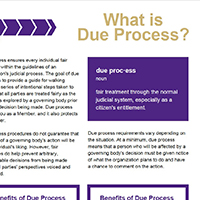 With the goal of making sure that all parties are treated fairly, following due process is good for your Chapter and its Members. So, What is Due Process? Check out this resource and the ones, below, to understand how due process prevents arbitrary and unreasonable decisions from being made and how it protects your Chapter.
With the goal of making sure that all parties are treated fairly, following due process is good for your Chapter and its Members. So, What is Due Process? Check out this resource and the ones, below, to understand how due process prevents arbitrary and unreasonable decisions from being made and how it protects your Chapter.
Q: Are there certain steps that need to be taken to ensure due process?
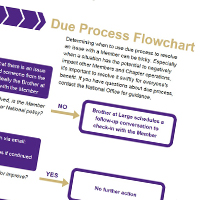 A: Yes. This Due Process Flowchart walks you through the entire process with “yes or no” questions to help you resolve Member issues.
A: Yes. This Due Process Flowchart walks you through the entire process with “yes or no” questions to help you resolve Member issues.
Q: Can an issue with a Member ever be resolved without using due process?
A: Yes. Knowing When to Use Due Process is important, and considering scenarios related to common Member issues should help to clarify.
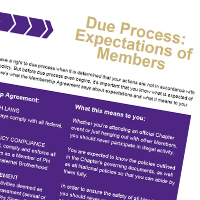 Q: How does a Member know what is expected of them?
Q: How does a Member know what is expected of them?
A: Due Process: Expectations of Members provides an overview of the Membership Agreement that all new Members sign. Your Chapter should also provide Member education throughout the year to ensure that all Members’ actions are in accordance with Chapter and National Policy.
Q: Our Chapter’s disciplinary process does not provide for due process. 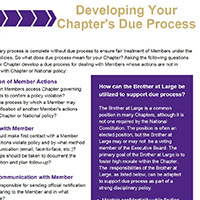 What should we do?
What should we do?
A: It’s important that your governing documents outline due process as part of a complete disciplinary process. You can start by Developing Your Chapter’s Due Process and considering how the Brother at Large or someone with a similar role can be utilized to support due process.
Q: Once our governing documents include due process, how can we make 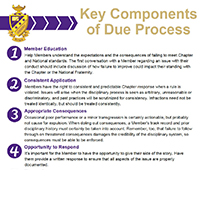 sure that it works?
sure that it works?
A: There are a few Key Components of Due Process that should be included in your policy. Check to make sure that none are missing from your governing documents, and make sure to account for conflicts of interest.
New resources are being added to the Resource Center all the time! Visit the Chapter Resources folder to view the current resources and let us know if you’d like more information on due process or any other topic by emailing ask@phisigmapi.org.
